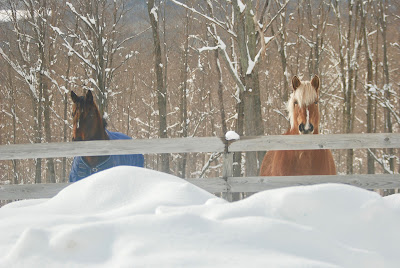Horses love to play in the snow
It's easy to understand the pleasures of riding horses out and about the trails and working in the arena during warm summer months. Winter - not so much, unless you are blessed to live in an temperate climate where the sun shines and temperatures don't plummet to the negative numbers.
Horses being the wonderful creatures they are, are perfectly content to live outside 24/7 especially if provided with some form of shelter from driving wind/rain/snow. Randomly as their nature dictates, they rarely utilize the shelter of a run-in shed during the coldest of winter weather. But provision of the option to seek refuge from harsh weather makes the equine owner feel better. At least it's there if they want it!
There is much discussion about whether it is prudent to force horses to exercise under the direction of a rider during very cold weather. The balance between respiratory damage that may be caused by forced exertion that opens up the airways of the horse and subjects the lung tissue to cold temperatures versus the need to keep the horse fit and exercised, joints moving etc., is a delicate topic.
The key to understanding the cause and effect of damage that could be caused, either temporarily or permanently to the lung tissue of the horse (and possibly also the rider), first requires an understanding of how the respiratory system in the horse is constructed and what Mother Nature has built into the system to warm cold air that is inhaled.
Cold weather riding doesn't just affect the respiratory system, it can also negatively impact the musculature, joints and tendons, feet and heart.
Here is a good summary of important factors to consider and how to determine your horse's individual risk based on not just the temperature, but the difference in temperature from what you horse is used to depending on the region in the U.S.A. where you live.
Dehydration, chill from sweat icing on the horse's coat and many other factors should be carefully evaluated before heading out to ride.
Sometimes a day off for the horse or a diminished work out that does not require as much exertion as the horse is used are better options than riding the horse for the sake of feeling guilty for pausing or halting the schedule of training.
Even pregnant mares love to play in the snow
For horse business owners that rely on income from lessons given at the barn, the likelihood is that very cold weather will result in cancellations of booked activities from clients. To counter this downturn in sales creative horse related activities can be substituted that still provide value for the client but involve less hardship on the horse.
For example, while it may be brutally cold outside with wind chill factors chiming in to deter even the hardiest of individuals from working outside (indeed frostbite might be a real risk), the interior of the barn is usually warm enough to offer a place to work with the horse. Kids can be taught handling and grooming lessons, office or tack room space can be utilized as an educational space for horse movies, games and Pony Club/4H style lessons on tack cleaning, leg wrapping and basic first aid techniques.
If the facility offers and indoor arena obviously there are more options to ride available. If mounted sessions are not viable consider doing some ground work such as obstacle training and activities that are less taxing on the horse's metabolic system.
For both horse and human proper equipment to keep both warm and to avoid injury from slipping on frozen or wet slippery surfaces is essential for the well-being of both parties in extreme weather.
The transition from one place to another, such as a relatively warm stall to a cold metal indoor, requires careful warm up and cool down times. The length of both should be extended from the norm on cold weather days. This will help give the horse's joints and tendons time to warm up and as a result there will be less chance of sustaining an injury. Handwalking your horse both before and after riding is a good idea in any weather, but is especially important in cold weather.
 |
| Always put your horse's needs first |
The age and fitness of the horse and rider should also be considered in the equation. Obviously an older horse will be stiffer and will likely suffer from arthritis, while a younger horse may exhibit excitement and exuberance from forced confinement and be hard to control. The work schedule and activities for the horse should be tailored to suit his individual needs.
All that being said, riding in the snow and keeping active during the cold weather is lots of fun and can be very productive.So don't be guilty about taking a day off, but don't overlook the benefits of getting off the couch and hitting the boarding barn, even if you are not a daily caregiver for the horse and required to be there!



